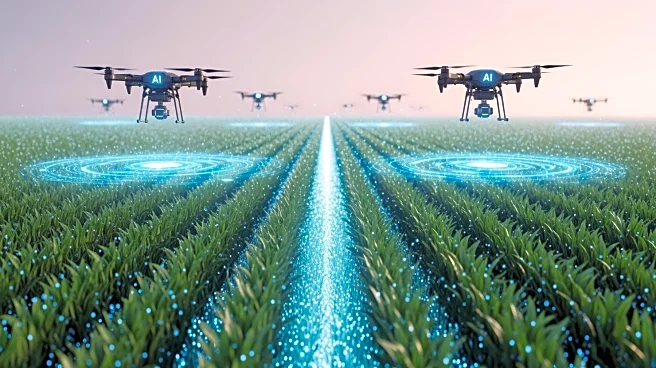What's Happening?
The U.S. Department of Agriculture (USDA) has unveiled its first comprehensive AI Strategy for fiscal years 2025-2026. This initiative marks a significant advancement in integrating artificial intelligence
and digital tools into national agriculture decision-making processes. The strategy aims to promote innovation and sustainable productivity within the agricultural sector. As part of this development, US Agriculture, LLC has partnered with CeresAI to implement AI-powered farmland monitoring, which will enable real-time crop health analytics and reduce the need for manual field inspections. This collaboration is expected to strengthen data-driven farm management and operational efficiency. Additionally, a major U.S. farmland investment firm has adopted advanced remote sensing and digital-twin technologies to shift from reactive to proactive management of farmland assets, enhancing transparency and oversight across various crop types.
Why It's Important?
The USDA's AI Strategy is poised to have a profound impact on the U.S. agricultural industry by fostering innovation and improving productivity. By integrating AI and digital tools, the strategy supports the transition towards more sustainable farming practices, which are crucial for addressing environmental challenges and ensuring food security. Stakeholders in the agricultural sector, including farmers and investment firms, stand to benefit from enhanced operational efficiency and data-driven decision-making. The adoption of AI-powered technologies can lead to more precise crop management, reduced waste, and optimized yields, ultimately contributing to the economic growth of the agriculture industry. Furthermore, the strategy aligns with global trends towards digital agriculture, positioning the U.S. as a leader in this field.
What's Next?
The implementation of the USDA's AI Strategy is expected to drive further advancements in digital agriculture technologies. Stakeholders, including farmers, ag-tech companies, and investment firms, may continue to explore partnerships and innovations that leverage AI for improved farm management and sustainability. As the strategy unfolds, there may be increased investment in AI research and development, as well as the deployment of digital tools across the agricultural sector. Additionally, the strategy could influence policy decisions related to agriculture and technology, encouraging further collaboration between government agencies and private entities to enhance the nation's agricultural capabilities.
Beyond the Headlines
The USDA's AI Strategy could have broader implications for ethical and legal considerations in agriculture. As AI technologies become more integrated into farming practices, issues related to data privacy, security, and the ethical use of AI may arise. Ensuring that AI applications are used responsibly and transparently will be crucial in maintaining public trust and support for digital agriculture initiatives. Moreover, the strategy may contribute to long-term shifts in agricultural practices, promoting a move towards regenerative farming and sustainable land management, which could have positive environmental impacts.











